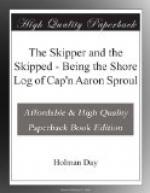The howl that followed clipped his last words. Men hopped upon the knife-nicked settees of the town house and waved their hats while they hooted. A group of voters, off at one side, sat and glowered at this hilarity. Out of the group rose Colonel Gideon, his long frame unfolding with the angularity of a carpenter’s two-foot rule. There were little dabs of purple on his knobby cheek-bones. His hair and his beard bristled. He put up his two fists as far as his arms would reach and vibrated them, like a furious Jeremiah calling down curses.
Such ferocious mien had its effect on the spectators after a time. Smyrna quailed before her ancient tyrant, even though he was dethroned.
“Almighty God has always wanted an excuse to destroy this town like Sodom and Gomorrah was destroyed,” he shouted, his voice breaking into a squeal of rage; “now He’s got it.”
He drove his pointed cap onto his head, gave a parting shake of his fists that embraced moderator, voters, walls, floor, roof, and all appurtenances of the town house, and stalked down the aisle and out. The silence in town meeting was so profound that the voters heard him welting his horse as he drove away.
After a time the moderator drew a long breath, and stated that he did not see Cap’n Aaron Sproul in the meeting, and had been informed that he was not present.
“I come past his place this mornin’,” whispered Old Man Jordan to his neighbor on the settee, “and he was out shovelin’ snow off’m the front walk, and when I asked him if he wa’n’t comin’ to town meetin’, he said that a run of the seven years’ itch and the scurvy was pretty bad, but he reckoned that politics was wuss. I should hate to be the one that has to break this news to him.”
“And seein’ how it’s necessary to have the first selectman here to be sworn in before the meetin’ closes this afternoon,” went on the moderator, “I’ll appoint a committee of three to wait on Cap’n Aaron Sproul and notify him of the distinguished honor that has been done him this day by his feller townsmen.”
He settled his spectacles more firmly upon his nose, and ran his gaze calculatingly over the assembled voters. No one of those patriotic citizens seemed to desire to be obtrusive at that moment.
“I’ll appoint as chairman of that notifying committee,” proceeded the moderator, “Entwistle Harvey, and as—”
“I shall have to decline the honor,” interrupted Mr. Entwistle Harvey, rising promptly. The voters grinned. They thoroughly understood the reason for Mr. Harvey’s reluctance.
“It ain’t that I’m any less a reformer than the others that has to-day redeemed this town from ring rule and bossism,” declared Mr. Harvey, amid applause; “it ain’t that I don’t admire the able man that has been selected to lead us up out of the vale of political sorrow—and I should be proud to stand before him and offer this distinguished honor from the voters of this town, but I decline because I—I—well, there ain’t any need of goin’ into personal reasons. I ain’t the man for the place, that’s all.” He sat down.




